News written by Rich Fiscus (February, 2012)
Written by Rich Fiscus @ 27 Feb 2012 9:29
 If there was any question about Google planning to offer their own pay TV service, it would seem to be answered by their recent applications in Kansas City, Missouri and Kansas City, Kansas.
If there was any question about Google planning to offer their own pay TV service, it would seem to be answered by their recent applications in Kansas City, Missouri and Kansas City, Kansas.
On February 17 they filed applications in both states to offer IPTV service to customers of the broadband Internet service they are currently building in the two cities. The filings came close on the heels of US and EU regulators approving their buyout of cable set-top box manufacturer Motorola Mobility.
Late last year a report appeared indicating Google was in negotiations to secure deals with media companies for such a service. While Google remains noncommittal about the rumor, earlier this month Ars Technica uncovered another clue in the form of an FCC application suggesting plans for an antenna array to receive commercial TV broadcasts, similar to a cable television head end, at a data center in Council Bluffs, Iowa.
Read more...
Written by Rich Fiscus @ 14 Feb 2012 8:02
 When Google announced their buyout of Motorola Mobility last year, it appeared to be primarily motivated by access to a handful of mobile phone patents. Even as the two biggest regulatory hurdles are cleared, there is growing evidence which suggests video technology was their primary goal all along.
When Google announced their buyout of Motorola Mobility last year, it appeared to be primarily motivated by access to a handful of mobile phone patents. Even as the two biggest regulatory hurdles are cleared, there is growing evidence which suggests video technology was their primary goal all along.
It's no secret that Google wants to be in your living room. Since 2010 they have made a number of moves in that direction, some more obvious than others. In January of 2010 YouTube started experimenting with movie rentals. By late April the program had been expanded twice. It was still small and focused on independent movies, but clearly past the experimental stage.
At the same time Google was working out a deal to buy On2, whose VP6 video compression was used in Adobe's Flash Video format. Google's primary goal was developing On2's VP8 standard into an open source, and more importantly royalty free, alternative to H.264 (MPEG-4 AVC).
At the time it seemed like a questionable move. H.264 had already been established as the new defacto standard for web video. Google, however, continued promoting VP8 through development of the WebM (Matroska-based) container format to combine it with royalty free Vorbis audio.
Read more...
Written by Rich Fiscus @ 14 Feb 2012 12:52
 Last Saturday opponents of ACTA, the secretly negotiated intellectual property treaty, held protests across the European Union.
Last Saturday opponents of ACTA, the secretly negotiated intellectual property treaty, held protests across the European Union.
The protests provoked two very different reactions from EU officials. One came from the European Commission, who reaffirmed their support for the treaty via Twitter. EC spokesman Cezary Lewanowicz tweeted, "ACTA does not change EU law, does not prevent people from sharing content online, will not monitor the internet."
What's more notable is that the EC statement appeared to be a reaction to comments made earlier in the day by European Parliament President Martin Shulz during a TV appearance in his home country of Germany. Shulz criticized ACTA for failing to adequately protect the public's rights. He said (translation via EUobserver.com):
Read more...
Written by Rich Fiscus @ 10 Feb 2012 4:06
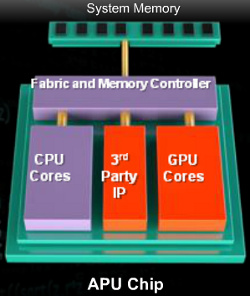 Researchers at North Carolina State University have found a way to improve CPU performance more than 20 percent using a GPU built on the same processor die.
Researchers at North Carolina State University have found a way to improve CPU performance more than 20 percent using a GPU built on the same processor die.
"Chip manufacturers are now creating processors that have a ?fused architecture,? meaning that they include CPUs and GPUs on a single chip," said Dr. Huiyang Zhou, who co-authored a new paper based on the research. He explained, "Our approach is to allow the GPU cores to execute computational functions, and have CPU cores pre-fetch the data the GPUs will need from off-chip main memory."
The research was performed in conjunction with AMD, who talked about plans to increase CPU/GPU integration in a presentation to analysts last week. Based on that presentation, the techniques identified in this research could be used in AMD processors within the next two years.
Although this research appears to be focused on current PC technology, most likely AMD's Fusion APU, it also has obvious applications for improving ARM processor performance. ARM's SOC (System On a Chip) design emphasizes power efficiency over speed, making it the standard choice for smartphones, tablets, and other mobile devices.
Read more...
Written by Rich Fiscus @ 10 Feb 2012 2:52
 Stories are emerging about a new device Google is testing which appears to be some sort of streaming media box.
Stories are emerging about a new device Google is testing which appears to be some sort of streaming media box.
Speculation began back in December when Google filed an application with the FCC asking for permission to test the mystery box. The application explains, "Google is developing an entertainment device that requires testing outside the laboratory environment."
It also provides details about some of the device's technical features. It will connect to Wi-Fi networks, home electronics equipment, and even Blutooth devices. The application also indicates 252 of the experimental devices are involved in the tests, which were scheduled to start on January 17 and run for six months.
According to a report from the New York Times, the device will initially be sold as a streaming music appliance, but later expanded with additional features. That seems plausible considering their streaming music service, Google Music, has been operating since last year.
One interesting question is how Motorola Mobility figures into Google's home entertainment plans. Their acquisition of the smartphone and set-top box maker could be approved by regulators in both the US and EU as soon as next week. While Motorola's smartphones are widely perceived as the focus of Google's interest, their set-top boxes could be just as important.
Written by Rich Fiscus @ 09 Feb 2012 6:23
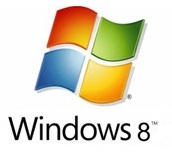 In a new blog post about WOA (Windows On ARM) Steven Sinofsky said user's will be limited to running software distributed by Microsoft. Sinofsky heads Microsoft's Windows and Windows Live Division.
In a new blog post about WOA (Windows On ARM) Steven Sinofsky said user's will be limited to running software distributed by Microsoft. Sinofsky heads Microsoft's Windows and Windows Live Division.
This revelation comes in the wake of speculation about whether WOA would be limited to the new Metro UI and why they won't let users turn off Secure Boot on ARM tablets. Metro UI is the touchscreen oriented UI originally developed for Windows Phone. Secure Boot is a BIOS security feature which prevents unauthorized code from running before the OS begins loading.
Sinofsky gave a number of arguments for controlling the software which will run on WOA. He started by talking about code written for the x86/x64 architecture found in traditional PCs. "WOA will not support any type of virtualization or emulation approach," wrote Sinofsky, "and will not enable existing x86/64 applications to be ported or run."
He claims this is because emulation and virtualization would result in poor performance and potential system instability. In addition, he said they wanted to ensure ARM tablets would never require a mouse or keyboard.
Read more...
Written by Rich Fiscus @ 09 Feb 2012 2:26
 Vonage has released new mobile apps for iOS and Android offering free voice and texting throughout the world.
Vonage has released new mobile apps for iOS and Android offering free voice and texting throughout the world.
In 2010 Vonage expanded into Skype territory with a Facebook app to offer free calling to other Facebook users. Their new Vonage Mobile apps take this a step further by combining free app to app calling on iOS and Android with prepaid calls to other phones.
Voice calls and texts between Vonage Mobile clients are free, potentially allowing people who have dropped home phone service to save on wireless minutes. Calls made through mobile data connections will still count against your data plan. Of course you can avoid that when your phone is connected to a Wi-Fi network.
Vonage Mobile works with your phone's existing address book. It will show you which contacts have Vonage Mobile accounts, and there's a SMS powered Invite feature (see the video below). To call a phone directly, instead of from app to app, you will need to buy credits. When you select a contact it will show you the per minute rate before you make a call.
Calling credits can be purchased directly within the app and go through the iTunes Store or Android Market. According to Vonage, their rates are "on average 70% less than major mobile carriers and 30% less than Skype2." Calls to Vonage home phone numbers are free.
Read more...
Written by Rich Fiscus @ 09 Feb 2012 9:45
 Microsoft is expected to be releasing the first public beta of Windows 8 at the end of this month.
Microsoft is expected to be releasing the first public beta of Windows 8 at the end of this month.
Microsoft has sent invitations to an official launch event for the Windows 8 Consumer Preview, scheduled for February 29 in Barcelona. The timing and location will put it right in the middle of this year's Mobile World Congress.
That's not surprising considering the massive changes in Windows 8 are nearly all designed specifically for tablet optimization. From the Metro UI to advanced power management and ARM processor support, Microsoft is betting heavily on tablets being the next wave of personal computers.
Read more...
Written by Rich Fiscus @ 08 Feb 2012 4:14
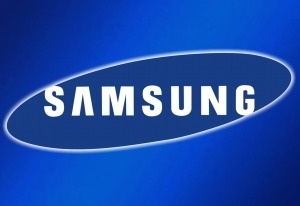 Over the last year, perhaps no Samsung products have gotten as much attention as their Android phones, but their success in the TV market is no less striking.
Over the last year, perhaps no Samsung products have gotten as much attention as their Android phones, but their success in the TV market is no less striking.
Samsung has been the worldwide leader in TV sales for several years. Unlike Japanese rivals such as Sony, they have also turned a tidy profit in the process.
It appears their strategy to continue that dominance will involve new models ranging from the high end units they showed off at CES last month to low end TVs to capture the budget segment. Reuters reports Kim Hyun-suk of Samsung's visual display division, indicated the new budget models would be ready in just a few weeks:
We've been preparing to introduce cheap models and have been studying to optimize production costs and retail prices," he said. "Those (cheap) models will be ready for sale in one or two months."
Most likely this is part of Samsung's plan to spend more than $40 on manufacturing facilities this year. Their focus is expected to be on mobile processors and displays. While lower end products don't have the best profit margins, they could be the key to success in expanding markets like China.
Written by Rich Fiscus @ 08 Feb 2012 11:57
 As Microsoft continues to extensively cover minute details about changes in Windows 8, they seem unwilling to address important questions about differences between the ARM and x86 versions.
As Microsoft continues to extensively cover minute details about changes in Windows 8, they seem unwilling to address important questions about differences between the ARM and x86 versions.
Considering ARM support is a cornerstone of their strategy for tablet support, which in turn is the primary focus of Windows 8, this has raised suspicions about Microsoft's plans. It appears to suggest the answers would be do more damage than the rampant speculation about their ulterior motives already has.
The two biggest unanswered questions are whether WoA (Windows on Arm) will be restricted to Metro Style apps and why disabling Secure Boot on ARM devices will be forbidden. Last month we explored how restricting WoA to Metro UI and the Secure Boot requirement could be used to create a walled garden ecosystem similar to Apple's iOS devices.
Windows Phone is already built around a walled garden. Given the iPad's incredible success, it seems logical Microsoft would copy this approach for tablets as wee, but maybe that doesn't mean abandoning the desktop UI. In fact, yesterday's post to the Building Windows 8 blog talked about optimizations for desktop programs on SOC (System On a Chip) architecture, which is dominated by ARM processors right now.
Read more...
Written by Rich Fiscus @ 07 Feb 2012 6:36
 The partnership between Redbox and Verizon to offer a subscription streaming and disc rentals could represent the biggest competitive threat Netflix has ever faced.
The partnership between Redbox and Verizon to offer a subscription streaming and disc rentals could represent the biggest competitive threat Netflix has ever faced.
A press release announcing the deal didn't offer any real details beyond a third quarter launch date and plans for multiplatform device support. A website setup to promote the new venture doesn't add any new information.
Since then, executives from Redbox and their parent company Coinstar have dropped some hints to FastCompany. While they seem to suggest the exact details haven't been worked out yet, it appears the Redbox component may be fairly limited. Coinstar CFO and interim Redbox CEO Scott Di Valerio explained:
Read more...
Written by Rich Fiscus @ 07 Feb 2012 5:18
 As the debate in Europe over the Anti Counterfeiting Trade Agreement (ACTA) heats up, a growing number of Europeans are protesting their governments for signing the treaty. Officials from 22 EU member states added their signatures to ACTA last month. It was finalized and signed by it's biggest backers, the US and Japan, last October.
As the debate in Europe over the Anti Counterfeiting Trade Agreement (ACTA) heats up, a growing number of Europeans are protesting their governments for signing the treaty. Officials from 22 EU member states added their signatures to ACTA last month. It was finalized and signed by it's biggest backers, the US and Japan, last October.
What may be the most interesting aspect of the anti-ACTA movement is that the most widespread and loudest opposition, as well as the most effective, isn't in the UK, France, or other countries traditionally considered strongholds of democracy and freedom. Instead it is in areas where oppressive dictatorships ruled until late in the 20th century.
For most people in the US and more powerful European nations, widespread censorship is something of an abstract concept. In countries controlled by the Soviet Union after World War II the situation is much different. Many people in these countries grew up in an environment of state controlled media, no free speech, and rampant government corruption.
We have already seen organized protests in Poland, where several members of Parliament also staged a protest of their own. Last week Polish Prime Minister Donald Tusk suspended the ratification process pending a more thorough analysis. The Warsaw Business Journal quotes Tusk saying, "Consultations about ACTA were incomplete. I am mad at my co-workers."
Read more...
Written by Rich Fiscus @ 06 Feb 2012 8:39
 Last week, AMD executives laid out a plan for developing a new SOC (System On a Chip) architecture for all their processors.
Last week, AMD executives laid out a plan for developing a new SOC (System On a Chip) architecture for all their processors.
CEO Rory Read, whose tenure at AMD began just five months ago, kicked off the presentations at AMD Financial Analyst Day by talking about the impact of ARM processors, mobile devices, and cloud services on the computing landscape, as well as the importance of relationships with OEMs.
He sees a situation similar to what happened in the 1980s, when mainframe dominance was first challenged by personal microcomputers. As an IBM employee for 23 years, starting in 1983, Read a had an insider's view of that transition. He believes the current environment is creating opportunities to compete with Intel in the same way early PC makers took on IBM.
He described how he sees AMD transitioning from the old PC oriented CPU paradigm, where speed and complexity were king, to what he called "an SOC kind of strategy." Rather than using the latest technology and running the risk of missed deadlines or disappointing products, he wants to focus on producing a single chip package with the features people already want and need.
Read more...
Written by Rich Fiscus @ 04 Feb 2012 12:53
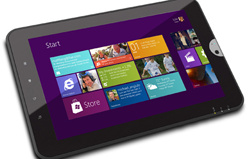 Although the Windows Phone platform unquestionably represented a quantum leap forward in Microsoft mobile technology, underneath its slick interface and app support beats the heart of an outdated OS.
Although the Windows Phone platform unquestionably represented a quantum leap forward in Microsoft mobile technology, underneath its slick interface and app support beats the heart of an outdated OS.
While iOS was developed from OS X and Android from Linux, Windows Phone 7 was built from an already dated platform called Windows CE. Starting with an existing mobile OS allowed Microsoft to develop Windows Phone into a finished product very quickly, but a lot of work would have been required to make it suitable for a modern tablet.
Last year Microsoft began detailing their plans for the touchscreen tablet market. While their vision does include Windows Phone's Metro interface, it is built on their next generation desktop OS. Windows 8 is essentially the culmination of work began at least a decade ago to redesign Windows for servers. The goal was to divide the OS into many separate parts which could be selectively installed.
The same changes which make it possible to minimize Windows' footprint on a server also proved useful in optimizing Windows for tablets. Combined with the touchscreen friendly Metro UI and new strategies to keep hardware in an idle state whenever possible, they make it possible for Microsoft to finally create a modern mobile OS.
Read more...
Written by Rich Fiscus @ 03 Feb 2012 11:13
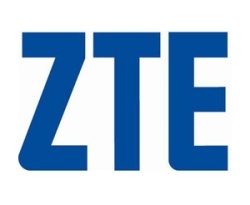 IDC has released their annual report on the mobile phone market. As expected, Nokia and Samsung came out the overall leaders, with Apple finishing the year in third place.
IDC has released their annual report on the mobile phone market. As expected, Nokia and Samsung came out the overall leaders, with Apple finishing the year in third place.
While Apple moved fewer than a third as many units as Samsung, and a quarter that of Nokia, as the only vendor in the top five who exclusively makes smartphones, their showing was quite impressive. By contrast, Nokia's ability to retain the top spot, despite a sharp decline in Symbian smartphone sales, demonstrates just how dominant they remain in the feature phone market.
But perhaps the most impressive company last year was ZTE. The Chinese phone manufacturer maintained the fifth position, moving more than 66 million handsets and narrowing the gap with fourth place LG Electronics. While LG's sales plummeted more than 18 million units last year, ZTE improved by nearly 16 million handsets. ZTE's 17.1 million unit performance in the last quarter of the year was nearly a match for LG's 17.7 million.
Read more...
Written by Rich Fiscus @ 03 Feb 2012 4:47
 With all the furor over SOPA and PIPA in recent months, the signing of the ACTA trade agreement last October by the US, Japan, and a handful of other countries has largely been ignored.
With all the furor over SOPA and PIPA in recent months, the signing of the ACTA trade agreement last October by the US, Japan, and a handful of other countries has largely been ignored.
The Anti Counterfeiting Trade Agreement resulted from efforts by the entertainment industry to mandate copyright law via international agreement. It was written in secret, with the input of movie and recording industry lobbyists, but with the general public provided information only via leaks from various parties to the negotiations.
According to US President Obama, ACTA isn't actually a treaty, and therefore requires no ratification by the US Senate. In the EU, the process of approving ACTA is now in full swing. Thanks in part to the significant publicity generated by SOPA and PIPA protests, officials from several EU governments are coming under fire for supporting ACTA.
Read more...
Written by Rich Fiscus @ 02 Feb 2012 1:39
 Google has been ordered to pay 500,000 euros in damages for offering Google Maps free of charge in France.
Google has been ordered to pay 500,000 euros in damages for offering Google Maps free of charge in France.
Bottin Cartographes sued Google, alleging they were offering Google Maps for free to push competitors out of the market. Once their competition is gone, Bottin claims, Google plans to begin charging for the service. Despite the fact their allegation seems to run counter to Google's standard business model of using free services to generate ad revenue, a French judge agreed.
Google has vowed to appeal the ruling, which even Bottin's lawyer called "a decision without precedent," according to a report from AFP. In addition to the damage award, Google was ordered to pay a 15,000 euro fine.
Google has been criticized around the world by companies in various sectors for allegedly abusing their dominance in search to give their own services an unfair advantage. However, this seems significantly different from the standard complaints because of the wild claim that Google plans to begin charging users once they eliminate the competition.
Read more...
Written by Rich Fiscus @ 02 Feb 2012 12:35
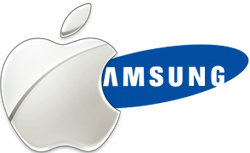 Although Samsung is still barred from selling the original Galaxy Tab 10.1 in Germany, the newer Galaxy Tab 10.1N will remain available for now.
Although Samsung is still barred from selling the original Galaxy Tab 10.1 in Germany, the newer Galaxy Tab 10.1N will remain available for now.
The Galaxy Tab 10.1N was designed to work around the ban on the Galaxy Tab 10.1 which was ordered last year, and upheld by a higher court late last month. However, Apple has also filed a lawsuit over the 10.1N, alleging infringement of a patent on displaying lists and documents on a mobile touchscreen device.
Despite Samsung's initial victory in keeping the Galaxy Tab 10.1N on the market, German patent expert Florian Mueller, of the FOSS Patents blog, suggests Apple may have a solid case if they appeal. "It's relatively surprising that the Munich court doubted the validity of that patent," wrote Mueller. "Judge Lucy Koh in California deemed that patent both valid and infringed."
He went on to explain:
Read more...
Written by Rich Fiscus @ 02 Feb 2012 10:37
 Have you been looking for a way to make Blu-ray (BDMV) or AVCHD discs from your home videos or TV captures? Do you have Blu-ray discs you want to backup, but want to strip out titles or audio streams to make them fit on a single layer BD-R?
Have you been looking for a way to make Blu-ray (BDMV) or AVCHD discs from your home videos or TV captures? Do you have Blu-ray discs you want to backup, but want to strip out titles or audio streams to make them fit on a single layer BD-R?
If the answer to either question is yes, you might want to take a look at MultiAVCHD, and our recently added guide can help you get started. MultiAVCHD is a free (donationware) program which uses a number of free programs, including Avisynth, FFDShow, and TSMuxer, to create BDMV or AVCHD discs.
Currently our MultiAVCHD guide is far from complete. Instead of creating a guide covering everything it can do, we decided to start with the basics and ask you what else we should include. Since being published last month, we have already expanded the guide once. We would be happy to let you know what else we can add for you.
MultiAVCHD Quick Start
The first section of Create AVCHD and Blu-ray Discs With MultiAVCHD, is a Quick Start guide. It covers installing MultiAVCHD and the necessary helper applications, setting some basic options, and creating a new disc using your own videos. These could be videos you've captured with a DVR or computer TV tuner or videos from a digital camera or smartphone.
Read more...

 If there was any question about Google planning to offer their own pay TV service, it would seem to be answered by their recent applications in Kansas City, Missouri and Kansas City, Kansas.
If there was any question about Google planning to offer their own pay TV service, it would seem to be answered by their recent applications in Kansas City, Missouri and Kansas City, Kansas.

 When Google announced their buyout of Motorola Mobility last year, it appeared to be primarily motivated by access to a handful of mobile phone patents. Even as the two biggest regulatory hurdles are cleared, there is growing evidence which suggests video technology was their primary goal all along.
When Google announced their buyout of Motorola Mobility last year, it appeared to be primarily motivated by access to a handful of mobile phone patents. Even as the two biggest regulatory hurdles are cleared, there is growing evidence which suggests video technology was their primary goal all along.
 Last Saturday opponents of ACTA, the secretly negotiated intellectual property treaty, held protests across the European Union.
Last Saturday opponents of ACTA, the secretly negotiated intellectual property treaty, held protests across the European Union.
 Researchers at North Carolina State University have found a way to improve CPU performance more than 20 percent using a GPU built on the same processor die.
Researchers at North Carolina State University have found a way to improve CPU performance more than 20 percent using a GPU built on the same processor die.
 In a new blog post about WOA (Windows On ARM) Steven Sinofsky said user's will be limited to running software distributed by Microsoft. Sinofsky heads Microsoft's Windows and Windows Live Division.
In a new blog post about WOA (Windows On ARM) Steven Sinofsky said user's will be limited to running software distributed by Microsoft. Sinofsky heads Microsoft's Windows and Windows Live Division.
 Over the last year, perhaps no Samsung products have gotten as much attention as their Android phones, but their success in the TV market is no less striking.
Over the last year, perhaps no Samsung products have gotten as much attention as their Android phones, but their success in the TV market is no less striking.
 The partnership between Redbox and Verizon to offer a subscription streaming and disc rentals could represent the biggest competitive threat Netflix has ever faced.
The partnership between Redbox and Verizon to offer a subscription streaming and disc rentals could represent the biggest competitive threat Netflix has ever faced.
 As the debate in Europe over the Anti Counterfeiting Trade Agreement (ACTA) heats up, a growing number of Europeans are protesting their governments for signing the treaty. Officials from 22 EU member states added their signatures to ACTA last month. It was finalized and signed by it's biggest backers, the US and Japan, last October.
As the debate in Europe over the Anti Counterfeiting Trade Agreement (ACTA) heats up, a growing number of Europeans are protesting their governments for signing the treaty. Officials from 22 EU member states added their signatures to ACTA last month. It was finalized and signed by it's biggest backers, the US and Japan, last October.
 Although the Windows Phone platform unquestionably represented a quantum leap forward in Microsoft mobile technology, underneath its slick interface and app support beats the heart of an outdated OS.
Although the Windows Phone platform unquestionably represented a quantum leap forward in Microsoft mobile technology, underneath its slick interface and app support beats the heart of an outdated OS.
 IDC has released their annual report on the mobile phone market. As expected, Nokia and Samsung came out the overall leaders, with Apple finishing the year in third place.
IDC has released their annual report on the mobile phone market. As expected, Nokia and Samsung came out the overall leaders, with Apple finishing the year in third place.
 With all the furor over SOPA and PIPA in recent months, the signing of the ACTA trade agreement
With all the furor over SOPA and PIPA in recent months, the signing of the ACTA trade agreement  Google has been ordered to pay 500,000 euros in damages for offering Google Maps free of charge in France.
Google has been ordered to pay 500,000 euros in damages for offering Google Maps free of charge in France.
 Although Samsung is still barred from selling the original Galaxy Tab 10.1 in Germany, the newer Galaxy Tab 10.1N will remain available for now.
Although Samsung is still barred from selling the original Galaxy Tab 10.1 in Germany, the newer Galaxy Tab 10.1N will remain available for now.
 Have you been looking for a way to make Blu-ray (BDMV) or AVCHD discs from your home videos or TV captures? Do you have Blu-ray discs you want to backup, but want to strip out titles or audio streams to make them fit on a single layer BD-R?
Have you been looking for a way to make Blu-ray (BDMV) or AVCHD discs from your home videos or TV captures? Do you have Blu-ray discs you want to backup, but want to strip out titles or audio streams to make them fit on a single layer BD-R?







